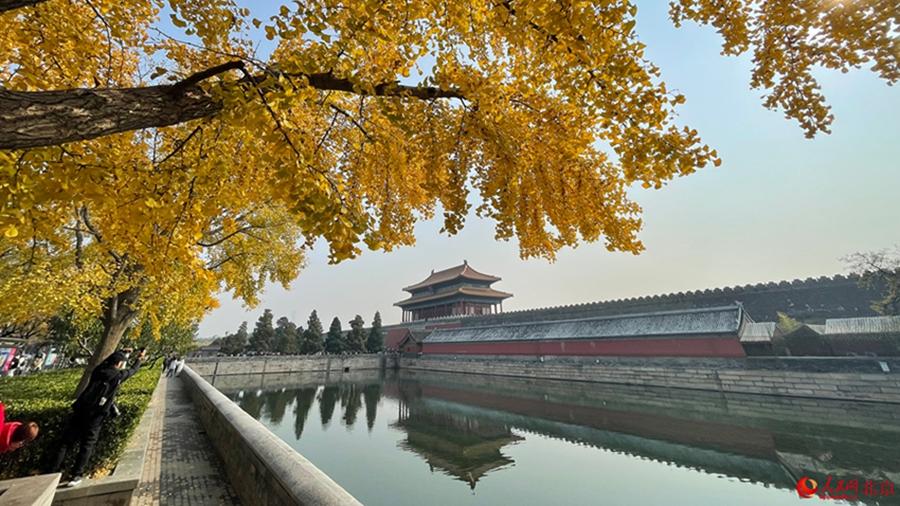Central China's Hubei speeds up efforts in building beautiful, harmonious countryside
In Baishuitang village in Babao township, Songzi city, central China's Hubei province, a river runs through the community, with well-maintained pathways and green belts stretching along both sides, creating a picturesque rural scene with golden wheat fields in the distance.
"In the past, wastewater was discharged directly into the river, causing an unbearable smell in summer," said Li Zhaoyu, an official with the village, as he patrolled along the riverbank with a straw hat on his head.

Photo shows the beautiful scenery of Zaoshulin village, Liusheng township, Zaoyang city, central China's Hubei province. (People's Daily Online/Li Ming)
Every 30 meters along the way, there is a sewer inspection manhole. He occasionally lifted the cover to check if the drainage at the bottom was clear.
Arriving at a sewage treatment facility, he opened the equipment control box to ensure that everything was running smoothly.
In 2022, Baishuitang village successfully established sewage treatment facilities, linking all household wastewater to an underground pipeline network for centralized treatment, said Li.
The treated water can be reused for irrigation in farmland, achieving cyclic utilization, he added.
With the implementation of sewage interception, dredging, and water replacement, the river's water quality has seen a notable improvement. creating a clear and clean environment that offers villagers a good place to relax and take a walk.
Li has been given the responsibility of managing and maintaining the sewage treatment facilities by the local villagers' committee, inspecting and patrolling the equipment on a regular basis.
"With centralized sewage treatment facilities, every household in our village has removed old-fashioned septic tanks, methane-generating pits, and abandoned pigsties. They are using clean and environmentally friendly toilets, which further improves the village environment," said a villager named Shi Wenqin.
The changes in Baishuitang village mirror Hubei's efforts to comprehensively promote rural revitalization.
In recent years, Hubei has picked up its pace in creating a livable, business-friendly, harmonious, and beautiful rural environment, taking a range of measures such as enhancing the layout of townships and villages, pursuing the coordinated development of rural infrastructure and public service systems, and improving the living environment in rural areas.
In Liuxiao village, Louhe township, Xiantao city, Hubei province, villagers have transformed the idle land around their houses into small courtyards, using old bricks and tiles that were left over from dismantling activities.
After removing old sheds, they built fences and planted flowers, fruit trees, and medicinal herbs, turning the idle land into nice gardens and orchards.
"In our rural development, we place great emphasis on formulating plans. While building the villages, we avoided large-scale demolition and construction, used local materials, and customized our approaches to fit the specific needs of every household. Now we have accomplished the planning for 106 villages," said an official with the bureau of agriculture and rural affairs of Xiantao city.
Xiantao city has encouraged residents to plant fruit trees, vegetables, flowers, and other plants around their houses to develop small-scale and quick-yielding courtyard economy, which not only beautified the environment but also increased villagers' income, the official explained.

Photo shows distinctive B&B hotels in Yehuaping village, Badong county, Enshi Tujia and Miao autonomous prefecture, central China's Hubei province. (People's Daily Online/Jiao Guobin)
Hubei aims to ensure basic access to sanitary toilets throughout the province by completing the construction and renovation of environmentally safe sanitary toilets for the identified 2.48 million households by 2025.
It also plans to have an additional 4,600 administrative villages in the province undergo simultaneous upgrades in rural sewage treatment and toilet facilities, thereby leading to a significant transformation of the living environment in rural areas from "clean, tidy, and orderly" to "tidy, beautiful, and livable."
In addition to the beautiful living environment, Hubei has also achieved notable improvement in its capabilities of providing basic public services.
Currently, Hubei is accelerating the building of rural elderly care service systems, developing rural elderly care facilities such as activity centers and elderly care institutions according to local conditions.
The province plans to increase the proportion of nursing beds in county-level elderly care institutions to over 60 percent and the proportion of such beds operated by private business entities to over 50 percent by 2025.
In 2019, a man named Wu Youyuan transformed several farmhouses into an elderly care center in his hometown, namely Maoci village in Shuangxiqiao township, Xian'an district, Xianning city, Hubei province, with the support of the local government.
Now, there are over 30 elderly residents living here.
"I moved here a few years ago. There are people cooking and doing laundry for us, and friends to chat and entertain with, which brightened my mood a lot," said Wu Chuanyao, a senior resident who is over 90 years old, while practicing drumming with a few other elderly people in the canteen of the care center.
In an effort to continuously strengthen the weak links of public services in rural areas, such as elderly care, medical services, and education, Hubei has channeled resources of basic public services to rural areas.
In recent years, the province has implemented innovative projects including one that introduces multiple college graduates into each village to deliver public services, allowing the elderly to live in comfort and the young to pursue their careers.
By the end of 2022, Hubei had equipped villages with 9,128 doctors with college degree through targeted training and social recruitment.
It plans to ensure that each village has at least one doctor who has received higher education by 2025.
In the clinic of Pengbei village, Tingsiqiao township, Xian'an district, doctor Chen Shi was examining the health condition of a senior resident. As one of the college graduates returning to hometowns at the call of the local government, she secured a position as a village doctor in her hometown in 2017.
"After the renovation and upgrading of the clinic, the working environment and hardware conditions have improved a lot. We can handle common illnesses here, and for serious cases, we promptly refer them to higher-level hospitals," Chen said.
Photos
Related Stories
Copyright © 2024 People's Daily Online. All Rights Reserved.









